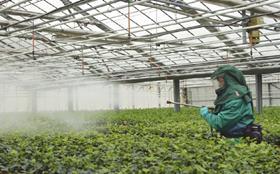
Research and development for new crop protection products needed by European farmers is in decline, according to a new analysis of market trends in the EU and around the world.
The study, from agribusiness consultants PhillipsMcDougall and highlighted by the European Crop Protection Association (ECPA), revealed that the number of active ingredients being developed and introduced to the EU is steadily decreasing – even as global expenditure on agricultural R&D is on the rise.
The share of global crop protection R&D focused on European markets has decreased from 33 per cent in the 1980s to only 16 per cent today, the report highlighted.
Moreover, the European market’s share of total worldwide R&D expenditure for new product development in agricultural life sciences is just 7.7 per cent today compared to 33 per cent in the 1980s.
For Europe’s farmers, this means fewer new crop protection solutions to help them meet the growing demand for healthy and affordable food. In the 1980s and 1990s, there were 4 new agrochemical active ingredient introductions per year in Europe; over the last decade the rate of new product introductions has fallen to just 1.2 per year.
“It’s clear that Europe’s challenging regulatory environment has led to a decline in R&D on products for use in the EU,” said Friedhelm Schmider, director general of the ECPA. “Agriculture and agrochemicals are global industries, but the EU has the most severe registration system for crop protection products, which includes a hazard-based assessment. When companies assess the risk involved in committing resources to R&D for new products, they are increasingly looking outside the EU.”
There is still a chance to alter this trend, Schmider noted.
'Europe can unlock all its innovation potential in agriculture by encouraging a regulatory environment more suited to innovation and job creation,' he said. 'The crop protection industry is ready to work with stakeholders and regulators to boost R&D solutions for European agriculture, so that Europe’s farmers can benefit – like growers in other parts of the world already do – from new tools to help them meet the growing demand for healthy and affordable food while protecting health and the environment. By innovating today, we will meet the challenges of tomorrow.”



